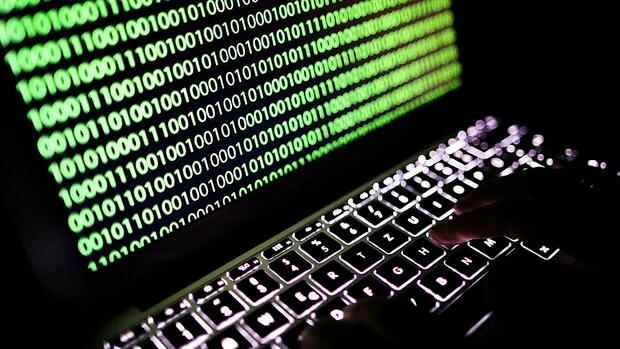Berlin Espionage, sabotage, cyber crime: security politicians from the traffic light coalition are warning of an increase in Russian cyber attacks on companies in Germany in view of the war in Ukraine.
The most recent attacks on German authorities and ministries are only a “foretaste of possible further attacks,” said the criminal policy spokesman for the SPD parliamentary group, Sebastian Fiedler, the Handelsblatt. The chairman of the secret service committee in the Bundestag, Konstantin von Notz, also sees an increased cyber risk for Germany.
“The IT security situation in Germany must continue to be viewed as extremely tense,” said the deputy head of the Greens parliamentary group in the Handelsblatt. “After several providers from the area of critical infrastructure were attacked in the past few weeks, we are currently observing an expansion of attacks to other areas as well.”
The parliamentary director of the FDP parliamentary group, Stephan Thomae, sees cyber attacks “very clearly” as part of the warfare of Russian President Vladimir Putin. “The more Putin comes under pressure, be it from Western sanctions or the lack of success of his troops in Ukraine, the more we have to expect large-scale attacks on Germany,” said Thomae. “These could not only affect state institutions, but increasingly also the economy.”
Top jobs of the day
Find the best jobs now and
be notified by email.
Just a few days ago, the Federal Office for the Protection of the Constitution warned of an increased risk of industrial espionage due to the sanctions imposed on Russia. In addition to attacks on the IT infrastructure, the Cologne authority referred to possible recruitment attempts by Russian citizens who work for German companies.
Cyber attacks: Association of medium-sized companies warns of “existence-threatening consequences” for companies
Following Moscow’s attack on Ukraine on February 24, Europe, the United States and other western countries have imposed tough sanctions on Russia. The Office for the Protection of the Constitution did not rule out an increase in cyber attacks on German companies and research institutions.
The pro-Russian group Killnet is currently conducting so-called DDoS attacks on its websites, the agency said. Massive requests are made to the websites until they collapse.
>> Also read here: Espionage war: How Europe is trying to smash the Russian spy network
The SPD politician Fiedler also warned that one should not fall into the delusional belief that Putin would only carry out his war of aggression in a classic and symmetrical manner on Ukrainian national territory. “His repertoire is larger,” emphasized the former chairman of the Association of German Criminal Investigators (BDK).
This included the spread of propaganda and disinformation or cyber attacks. “Russian cyber attackers are among the most aggressive and skilled in the world,” Fiedler said. Not only authorities and institutions, but also German medium-sized companies are possible targets of Russian hackers.
The federal director of the BVMW association of medium-sized companies, Markus Jerger, sees medium-sized companies particularly at risk from cyber attacks. This is because “relatively few companies are backing up data regularly or have prepared crisis response plans,” Jerger said. In addition, there is often a lack of in-house IT departments and the corresponding specialists, or the people entrusted with data security are not sufficiently trained.
The consequences for small and medium-sized enterprises (SMEs) in particular are “serious,” said Jerger. “For companies with fewer than 50 employees, one in four cyber attacks has very serious or even existence-threatening consequences.”
Traffic light announces countermeasures to protect critical infrastructure
The Greens interior expert von Notz spoke of “numerous” commercial companies that were increasingly becoming the focus of the attackers. German security authorities, democratic institutions and constitutional bodies such as the Bundestag are also affected, as well as scientific institutions. Von Notz therefore warned that the threat situation should be taken “very seriously”, that appropriate security precautions be taken and that advice from the Federal Office for Information Security (BSI), for example, should be used.
>> Also read here: “We are very vulnerable”: Four reasons why companies should fear Russian hackers
The BVMW association of medium-sized companies advised companies to expand investments in cyber security. “Current findings show that medium-sized companies sometimes have to double their spending,” said BVMW Federal Managing Director Jerger. He also sees the state as having a responsibility to help. “In order to set incentives, we are in favor of a government investment subsidy for IT security,” he said. “Investments in protecting our economy must be rewarded.”
For the SPD interior expert Fiedler, however, not only cyber attacks are a danger. In order to be able to operate in other countries, Russia also uses classic espionage and sabotage and also carries out attacks.
Von Notz announced countermeasures by the traffic light coalition. “We will further increase the resilience of our digital democracy and infrastructure and prioritize the projects anchored in the coalition agreement,” said the Green politician. Important projects such as the submission of a law for the protection of critical infrastructures (KRITIS umbrella law) or the creation of a cyber relief organization docked with the Federal Agency for Technical Relief (THW) are now being pushed.
More: The Office for the Protection of the Constitution warns of fake news from the Russian embassy
